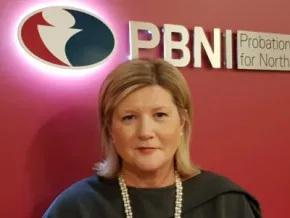Dr Geraldine O’Hare, Probation Board of Northern Ireland
For the past four years, the Probation Board for Northern Ireland has been piloting an intensive community sentence called ‘The Enhanced Combination Order’ (ECO). It commenced in October 2015 in Courts in the Ards and Armagh & South Down areas initially, with expansion to the North West in October 2018. The ECO is an alternative to short prison sentences of 12 months or less.
ECOs focus on rehabilitation, restorative practice and desistance. All participants are offered an assessment by psychologists in respect of any mental health issues and parenting/family support work is also included, where applicable. The requirements for service users subject to such orders include participation in victim focussed work, and if possible, a restorative intervention, and an accredited programme, if appropriate, such as ‘Thinking Skills’.
In addition, individuals on the Orders undertake intensive offending focussed work with their Probation Officer, supported by other Probation staff. Probation Officers work extensively on the requirement to undertake intensive offending focussed work with participants, exploring the impact of participants’ behaviour on victims, their family and the community. Evaluation (2017) found qualitative evidence suggesting that participants thought the order had helped them address their problems and the way they thought about their future offending behaviour. Participants often demonstrated a high level of respect for their Probation Officer and were keen ‘not to let them down’.
Participants also had to complete unpaid work within local communities. An interim evaluation in 2017 found that 124 participants had paid back almost 11,585 community service hours, over £87,000 worth of work, into their communities, including sorting donated items in charity shops, working with sports clubs and undertaking manual squad work such as gardening tasks within a community setting.
The evaluation in 2017 found that the number of custodial sentences of 12 months or less awarded by courts involved in the ECO pilot decreased by 10.5% between 2015 and 2016. In addition, it suggested encouraging indications on the ECO’s impact on reoffending, finding that the offending rate ECO participants in the six months following being sentence was 17.3%, compared to a re-offending rate of 57.7%, in the six months pre-sentencing.
The Lord Chief Justice of Northern Ireland, Sir Declan Morgan, said of the ECO: “The judges who have been directly involved now see ECOs as providing a constructive alternative to short spells of imprisonment… ECOs are seen as a very credible alternative to prison, rather than as a substitute for a less onerous community disposal. I fully support the continuation of the pilot and I would very much like to see it rolled out further to other areas.”

Dr Geraldine O’Hare is the Director of Rehabilitation for the Probation Board for N. Ireland, and is also a Chartered and Registered Forensic Psychologist. She leads on the areas of Rehabilitation, Programme for Government, North/South Co-operation, Business Planning and Research. Geraldine is the organisation’s Senior Information Asset Owner and Chair of the Reducing Offending in Partnership Steering Group. Geraldine was recently awarded a Winston Churchill Fellowship and has travelled to the USA to research Problem Solving Courts with a particular interest in Mental Health, Domestic Violence and Drug Courts. Geraldine has worked with the Department of Justice to implement the first Problem Solving Courts in N. Ireland.